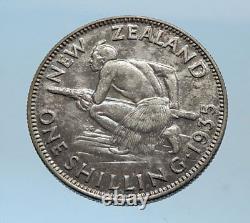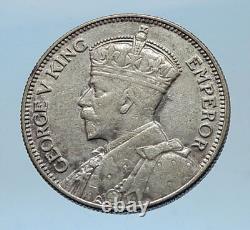1935 NEW ZEALAND Silver One Shilling Coin GEORGE V Native Maori Warrior i68593




Item: i68593 Authentic Coin of. King: 6 May 1910 - 20 January 1936 1935 Silver One Shilling 23.62mm (5.66 grams) 0.500 Silver 0.0902 oz. Kruger-Gray GEORGE V KING EMPEROR, Crowned bust of king George V left wearing imperial clothing.
1934, Crouched Maori warrior left. The Maori are the indigenous Polynesian people of New Zealand. The Maori originated with settlers from eastern Polynesia, who arrived in New Zealand in several waves of canoe voyages at some time between 1250 and 1300 CE. Over several centuries in isolation, the Polynesian settlers developed a unique culture that became known as the "Maori", with their own language, a rich mythology, distinctive crafts and performing arts. Horticulture flourished using plants they introduced, and later a prominent warrior culture emerged. The arrival of Europeans to New Zealand starting from the 17th century brought enormous change to the Maori way of life. Maori people gradually adopted many aspects of Western society and culture.Initial relations between Maori and Europeans were largely amicable, and with the signing of the Treaty of Waitangi in 1840, the two cultures coexisted as part of a new British colony. Rising tensions over disputed land sales led to conflict in the 1860s. Social upheaval, decades of conflict and epidemics of introduced disease took a devastating toll on the Maori population, which went into a dramatic decline. But, by the start of the 20th century, the Maori population had begun to recover, and efforts have been made to increase their standing in wider New Zealand society and achieve social justice. Traditional Maori culture has enjoyed a revival, and a protest movement emerged in the 1960s advocating Maori issues.
In the 2013 census, there were approximately 600,000 people in New Zealand identifying as Maori, making up roughly 15% of the national population. They are the second-largest ethnic group in New Zealand, after European New Zealanders ("Pakeha"). In addition, more than 120,000 Maori live in Australia. The Maori language (known as Te Reo Maori) is still spoken to some extent by about a fifth of all Maori, representing 3% of the total population. Many New Zealanders regularly use Maori words and expressions, such as " kia ora ", while speaking English. Maori are active in all spheres of New Zealand culture and society, with independent representation in areas such as media, politics and sport. Disproportionate numbers of Maori face significant economic and social obstacles, with lower life expectancies and incomes compared with other New Zealand ethnic groups. They suffer higher levels of crime, health problems, and educational under-achievement.Socioeconomic initiatives have been implemented aimed at closing the gap between Maori and other New Zealanders. Political redress for historical grievances is also ongoing. George V (George Frederick Ernest Albert; 3 June 1865 - 20 January 1936) was King of the United Kingdom and the British Dominions, and Emperor of India, from 6 May 1910 until his death in 1936. He was the second son of Albert Edward, Prince of Wales (later King Edward VII), and the grandson of the reigning British monarch, Queen Victoria.
From the time of his birth, he was third in the line of succession behind his father and his elder brother, Prince Albert Victor, Duke of Clarence and Avondale. From 1877 to 1891, George served in the Royal Navy, until the unexpected death of his elder brother in early 1892 put him directly in line for the throne. On the death of his grandmother in 1901, George's father became King-Emperor of the British Empire, and George was created Prince of Wales. He succeeded his father in 1910. He was the only Emperor of India to be present at his own Delhi Durbar. His reign saw the rise of socialism, communism, fascism, Irish republicanism, and the Indian independence movement, all of which radically changed the political landscape. The Parliament Act 1911 established the supremacy of the elected British House of Commons over the unelected House of Lords. As a result of the First World War (1914-18) the empires of his first cousins Tsar Nicholas II of Russia and Kaiser Wilhelm II of Germany fell while the British Empire expanded to its greatest effective extent.In 1917, George became the first monarch of the House of Windsor, which he renamed from the House of Saxe-Coburg and Gotha as a result of anti-German public sentiment. In 1924 he appointed the first Labour ministry and in 1931 the Statute of Westminster recognised the dominions of the Empire as separate, independent states within the Commonwealth of Nations.
He was plagued by illness throughout much of his later reign and at his death was succeeded by his eldest son, Edward VIII. New Zealand is an island nation in the southwestern Pacific Ocean. The country geographically comprises two main landmasses-the North Island (or Te Ika-a-Maui), and the South Island (or Te Waipounamu)-and around 600 smaller islands. New Zealand is situated some 1,500 kilometres (900 mi) east of Australia across the Tasman Sea and roughly 1,000 kilometres (600 mi) south of the Pacific island areas of New Caledonia, Fiji, and Tonga. Because of its remoteness, it was one of the last lands to be settled by humans.
During its long period of isolation, New Zealand developed a distinct biodiversity of animal, fungal and plant life. The country's varied topography and its sharp mountain peaks, such as the Southern Alps, owe much to the tectonic uplift of land and volcanic eruptions. New Zealand's capital city is Wellington, while its most populous city is Auckland. Sometime between 1250 and 1300 CE, Polynesians settled in the islands that later were named New Zealand and developed a distinctive Maori culture. In 1642, Dutch explorer Abel Tasman became the first European to sight New Zealand. In 1840, representatives of Britain and Maori chiefs signed the Treaty of Waitangi, which declared British sovereignty over the islands. In 1841, New Zealand became a colony within the British Empire and in 1907 it became a Dominion. Today, the majority of New Zealand's population of 4.7 million is of European descent; the indigenous Maori are the largest minority, followed by Asians and Pacific Islanders. Reflecting this, New Zealand's culture is mainly derived from Maori and early British settlers, with recent broadening arising from increased immigration.The official languages are English, Maori and New Zealand Sign Language, with English predominant. New Zealand is a developed country and ranks highly in international comparisons of national performance, such as health, education, economic freedom and quality of life.
Since the 1980s, New Zealand has transformed from an agrarian, regulated economy to a market economy. Nationally, legislative authority is vested in an elected, unicameral Parliament, while executive political power is exercised by the Cabinet, led by the Prime Minister, who is currently Bill English. Queen Elizabeth II is the country's head of state and is represented by a governor-general, currently Dame Patsy Reddy. In addition, New Zealand is organised into 11 regional councils and 67 territorial authorities for local government purposes. The Realm of New Zealand also includes Tokelau (a dependent territory); the Cook Islands and Niue (self-governing states in free association with New Zealand); and the Ross Dependency, which is New Zealand's territorial claim in Antarctica. New Zealand is a member of the United Nations, Commonwealth of Nations, ANZUS, Organisation for Economic Co-operation and Development, Pacific Islands Forum, and Asia-Pacific Economic Cooperation. World-renowned expert numismatist, enthusiast, author and dealer in authentic ancient Greek, ancient Roman, ancient Byzantine, world coins & more. Ilya Zlobin is an independent individual who has a passion for coin collecting, research and understanding the importance of the historical context and significance all coins and objects represent. Send me a message about this and I can update your invoice should you want this method. Getting your order to you, quickly and securely is a top priority and is taken seriously here. Great care is taken in packaging and mailing every item securely and quickly.What is a certificate of authenticity and what guarantees do you give that the item is authentic? You will be very happy with what you get with the COA; a professional presentation of the coin, with all of the relevant information and a picture of the coin you saw in the listing. Additionally, the coin is inside it's own protective coin flip (holder), with a 2x2 inch description of the coin matching the individual number on the COA. Whether your goal is to collect or give the item as a gift, coins presented like this could be more prized and valued higher than items that were not given such care and attention to. When should I leave feedback?
Please don't leave any negative feedbacks, as it happens sometimes that people rush to leave feedback before letting sufficient time for their order to arrive. The matter of fact is that any issues can be resolved, as reputation is most important to me. My goal is to provide superior products and quality of service.
How and where do I learn more about collecting ancient coins? Visit the Guide on How to Use My Store. For on an overview about using my store, with additional information and links to all other parts of my store which may include educational information on topics you are looking for.


